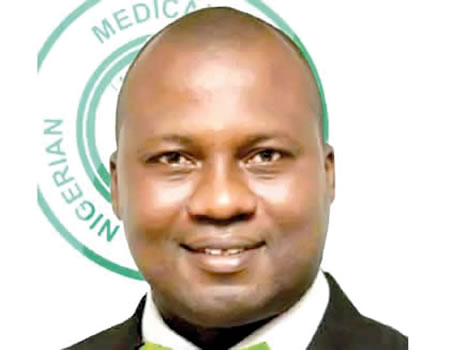The Nigeria Medical Association (NMA) has expressed displeasure at the continued obstruction of the Nigeria Centre for Disease Control (NCDC) work by the governments of Kogi and Cross River States.
The association said the obstruction was despite the provisions in the NCDC Establishment Act (2018) which empower the organisation to “prevent, detect, monitor and control” activities and programs for the national response against infectious diseases, epidemics and other public health emergencies; and also to lead, develop, coordinate” these activities.
To this end, the NMA called on President Muhammadu Buhari, to urgently intervene, saying that the development was very unfortunate, condemnable and required the urgent intervention of the President.
The NMA gave this position in a statement issued last night and titled: “NMA policy advisory: reaching the 5000 marks; resolving issues around testing, coordination and expansion of public health facilities; “signed by the President of NMA, Dr Francis Faduyile and the Secretary-General, Dr Olumuyiwa Odusote.
The statement read: “The Association has noted with displeasure the continued obstruction of the National Centre for Disease Control and Prevention (NCDC) by the governments of Kogi and Cross River State. NMA views this development as unfortunate, condemnable and requires urgent intervention by the President of the Federal Republic of Nigeria.”
The NMA described the acceptance of the herbal remedy from Madagascar, ‘Covid Organics,’ by the Federal Government as an act of pulling all stops in search of remedial interventions in protecting the lives of our citizens.
The statement read: “We appreciate the concerns of our colleagues in the Pharmaceutical Society of Nigeria (PSN) and bemoan the situation where Nigeria appears to be lagging and not leading the Black race’s response against the pandemic.
“NMA insists that the herbal mixture undergoes due diligence based on scientific methods before authorizing its use in the polity while urging the government to leapfrog the revitalization of research and production activities of our pharmaceutical industries.
“The Association is carefully studying the overall impact of the newly approved WHO’s home treatment policy for COVID-19 patients. While accepting the noticeable acute shortage of bed spaces available at the designated centres, NMA cautions that the peculiarities in Nigeria should be taken into consideration and therefore urges FG to adopt this new regulation.”
It added: “Nigeria has an average of six persons per household; and consequently, wholesale adoption of this guideline may not be applicable here. We risk an explosive regime of community transmission if we adopt the guidelines completely without modifications, especially in situations of poor housing and overcrowding.
“Following from the above, NMA is of the firm conviction that revamping our abandoned General Hospitals and Primary Health Centres (PHCs) will mitigate the challenges with home treatment and acute shortage of bed spaces. We still maintain that isolation and treatment centres should stand-alone to avoid the nosocomial spread of this infection especially in settings of poor hygiene practices.
“While the NCDC has carried out only 29,400 tests, as at 14th May 2020, we appreciate the reasons advanced for the ‘smart testing’ option by the NCDC. However, it has become apparent that this method has not revealed the real incidence of COVID-19 in Nigeria. NMA, therefore, advocates fast-tracking of testing using innovative specimen collection and transport modalities to ameliorate this deficit in technique.
“NMA appreciates quite immensely the Coalition against COVID-19 (CA-COVID) which is a coalition of corporate Nigeria mobilising resources to mitigate the embarrassing infrastructural deficiencies in the health sector for the management of the outbreak.
“We appeal that they extend their humanitarian and patriotic gesture outside Abuja to other parts of the Federation as promised, especially the states with high incidence. NMA also calls on the Coalition not to abandon healthcare delivery to the government alone post-COVID as the current pandemic has exposed several deficiencies in the system.”






